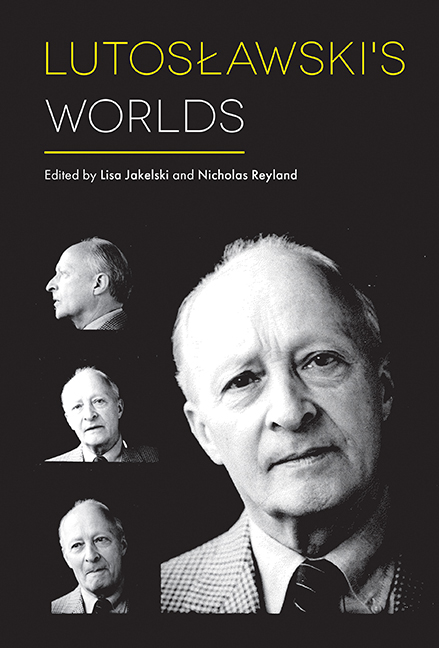Book contents
- Frontmatter
- Dedication
- Contents
- List of Figures
- List of Tables
- List of Music Examples
- List of Contributors
- Acknowledgements
- Introduction
- PART I mourning, modernism, and genius
- PART II other lutoslawskis
- 4 Behind the Curtain of Oblivion: Lutoslawski's Music for Theatre and Radio Plays
- 5 Derwid as Lutoslawski's Patron
- 6 Witold Lutoslawski in Occupied Warsaw
- 7 Lutoslawski and Sonoristics
- PART III documents
- PART IV political engagement
- PART V legacies
- Bibliography
- Index
5 - Derwid as Lutoslawski's Patron
from PART II - other lutoslawskis
Published online by Cambridge University Press: 14 June 2019
- Frontmatter
- Dedication
- Contents
- List of Figures
- List of Tables
- List of Music Examples
- List of Contributors
- Acknowledgements
- Introduction
- PART I mourning, modernism, and genius
- PART II other lutoslawskis
- 4 Behind the Curtain of Oblivion: Lutoslawski's Music for Theatre and Radio Plays
- 5 Derwid as Lutoslawski's Patron
- 6 Witold Lutoslawski in Occupied Warsaw
- 7 Lutoslawski and Sonoristics
- PART III documents
- PART IV political engagement
- PART V legacies
- Bibliography
- Index
Summary
Derwid was born on 1 February 1957. He was conceived by Witold Lutosławski, who was then forty-four years old. This new persona emerged out of Lutosławski's need to harmonise his practical and professional interests – to take care of his financial needs while maintaining his dignity and prestige.
The 1950s were a transitional period in Poland's history. After Andrzej Panufnik's emigration in 1954, Lutosławski was considered to be the nation's number-one composer; as a result, he was in the eye of his milieu's storm. On 9 March 1957, during the opening of the Polish Composers’ Union Convention, it was Lutosławski who declared socialist realism to be bankrupt and proclaimed the freedom of art and artists. New times, however, required new methods: for composers, enjoying their newly gained freedom meant devising new musical languages, a time-consuming activity that required financial independence. Lutosławski was certainly not poor, but the less time he had to spend writing or conducting functional music, the better it would be for his creative work (at the time, he had just composed the Five Songs to texts by Kazimiera Iłłakowicz, and he had begun working on Music of Mourning). Popular music, burgeoning in Poland during the post-Stalin Thaw, gave him just this opportunity, because a song, when properly disseminated, could provide its author with good royalties. But it could hardly be expected that someone like Lutosławski, who was extremely serious about his activity as a composer, would let his name be associated with dancing and popular songs. During the Stalinist years, he had already had to publish mass songs under his own name – an experience that must have been quite unpleasant for him. So Derwid had to be born.
Derwid survived six years. He left behind thirty-five songs. Roughly speaking, Derwid composed an hour of music; strictly speaking, he wrote conventionally harmonised tunes in fashionable dance rhythms, such as foxtrots, tangos, waltzes, and slow-foxes. These songs quickly paid off, and, with time, Lutosławski earned about ten times more money from Derwid's royalties than he collected from the works he published under his ‘true’ name. Lutosławski's activities as a popular song composer thus allowed him to constrain his collaboration with Polish Radio (he left his post on 1 September 1958, and in 1960 he ceased collaborating with the Radio altogether).
- Type
- Chapter
- Information
- Lutoslawski's Worlds , pp. 119 - 140Publisher: Boydell & BrewerPrint publication year: 2018
- 1
- Cited by



